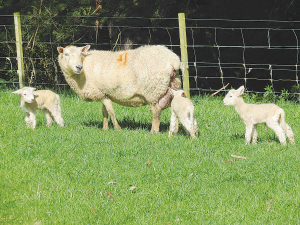Move over ham, here comes lamb
It’s official, lamb will take centre stage on Kiwi Christmas tables this year.
 The Code of Welfare for Sheep and Beef Cattle 2018 clearly states that lambing paddocks should be chosen to mitigate animal welfare challenges such as adverse weather.
The Code of Welfare for Sheep and Beef Cattle 2018 clearly states that lambing paddocks should be chosen to mitigate animal welfare challenges such as adverse weather.
With lambing and calving about to start, Beef + Lamb New Zealand is reminding farmers of the importance of providing ewes and cows with suitable, well-sheltered areas for lambing and calving.
Will Halliday, Beef + Lamb New Zealand’s senior advisor for animal welfare, says giving birth can be a challenging time for the dam, offspring and the farmer. He adds that potential compromises to animal welfare include disturbance from people, other animals, weather and lack of shelter.
“Shelter is particularly important at this time of the year and will help prevent deaths through starvation and exposure as new-born lambs are very susceptible to wind chill.”
Halliday says it has been a tough year in many regions.
While it might be tempting to run pregnant ewes or cows on forage crops right up to the point of lambing or calving, Halliday recommends farmers allow enough time for pregnant stock to settle into their lambing or calving areas before they give birth.
“In an ideal situation, ewes can be identified according to their lambing cycle, so later lambing ewes can be left on forage crops for longer,” he explains. “But it has been a difficult winter and this has made standard management practices challenging.”
Halliday suggests farmers keep a close eye on ewes and cows and try and move them to a dry, sheltered area so they can calve or lamb with minimal disturbance.
“While it might be tempting to leave them on the forage crop for just a few more days, this can compromise the health of both the ewe or cow and her progeny.”
He says the Code of Welfare for Sheep and Beef Cattle 2018 clearly states that lambing and calving paddocks should be chosen to mitigate animal welfare challenges such as adverse weather or natural hazards and lambing and calving sites should be disturbed as little as possible.
“We know farmers are always striving to do the best by their livestock, but this year they are having to balance up feed resources with maternal behaviour and it is not always easy to get that balance right.”
Spring alert!
The winter and early spring period can give rise to a number of disease challenges for livestock.
This is especially the case in years when feed is tight and body condition is not as high as it could be.
Pregnant animals have increased metabolic demand that continues beyond birth and into lactation. The energy required to sustain pregnancy and lactation has to come from somewhere and may require an animal to divert energy spent on its immune system to other parts of its physiology.
Two broad categories of such disease are metabolic and infectious/contagious.
Metabolic diseases include such conditions as hypocalcaemia (milk fever), hypomagnesaemia (staggers), pregnancy toxaemia (sleepy sickness), and ketosis.
These are generally prevented through diet or supplementation and can be treated with over-the-counter remedies.
Infectious and contagious diseases can include conditions like abortion storms caused by Toxoplasma or Campylobacter, and outbreaks of diarrhoea caused by Salmonella or Rotavirus.
All of the diseases mentioned here can be prevented by effective vaccination. It is highly recommended that abortions or clusters of sick or dead animals are investigated by a veterinarian as early as possible in order to identify the cause and prevent any outbreak from worsening.
Agrisea NZ has appointed Craig Hudson as it's new chief growth officer.
State farmer Landcorp, trading as Pamu, is a forecasting a full-year net profit of around $100 million.
Tony Aitken, chief executive of Ruralco, has been awarded the Excellence in Business Leadership Award at the ANZ Business of the Year Awards.
Global trade has been thrown into another bout of uncertainty following the overnight ruling by US Supreme Court, striking down President Donald Trump's decision to impose additional tariffs on trading partners.
Controls on the movement of fruit and vegetables in the Auckland suburb of Mt Roskill have been lifted.
Fonterra farmer shareholders and unit holders are in line for another payment in April.

OPINION: Here w go: the election date is set for November 7 and the politicians are out of the gate…
OPINION: ECan data was released a few days ago showing Canterbury farmers have made “giant strides on environmental performance”.